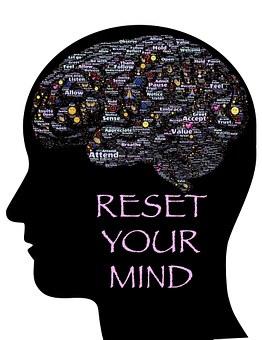Rules of the Mind

In The Art of Hypnosis C. Roy Huntercredits his mentor, Charles Tebbetts, for these rules. They are reprinted with permission.
The Rules of the Mind are evidence-based observations about the way the mind works. These rules provide insight into communicating with the subconscious mind.
1. Every thought or idea causes a physical reaction
Your thoughts can affect all of the functions of your body. WORRY thoughts trigger changes in the stomach that in time can lead to ulcers. ANGER thoughts stimulate your adrenal glands and the increased adrenaline in the blood stream causes many body changes. ANXIETY and FEAR thoughts affect your pulse rate.
Ideas that have strong emotional content almost always reach the subconscious mind, because it is the feeling mind. Once accepted, these ideas continue to produce the same body reactions over and over again. In order to eliminate or change chronic negative bodily reactions we must reach the subconscious mind and change the idea responsible for the reaction. This is easily done with hypnosis and autosuggestion.
Charles Tebbetts believed that the mind could make you sick or keep you well. For example, he believed that a person could easily produce a headache just by imagining one. He also demonstrated the ultimate benefit of self-hypnosis when a stroke totally paralyzed him and left him unable to talk. Through self-hypnosis, he recovered and continued to teach hypnotherapy for many years afterward.
2. What’s expected tends to be realized
The brain and the nervous system respond only to mental images. It does not matter if the image is self-induced or from the external world. The mental image formed becomes the blueprint, and the subconscious mind uses every means at its disposal to carry out the plan. Worrying is a form of programming a picture of what we don't want. But the subconscious mind acts to fulfill the pictured situation. "The things that I have feared have come upon me."
Many persons suffer from chronic anxiety, which is simply a subconscious mental expectancy that something terrible will happen. On the other hand, we all know people who seem to have the "magic" touch Life seems to shower them with blessings for no apparent reason, and so we call them "lucky." What seems to be luck is in reality positive mental expectancy, a strong belief that success is deserved. "We become what we think about."
Physical health is largely dependent upon our mental expectancy. Physicians recognize that if a patient expects to remain sick, lame, paralyzed, helpless, even to die, the expected condition tends to be realized. Here is where self-hypnosis can become the tool to remove despondency and negative attitudes and bring about a hopeful positive expectancy--the expectancy of health, strength and well-being, which then tends to be realized.
This is also called the law of expectancy. He told my class about a man who died while being bathed by a nurse, because he had a total expectation that if he were ever bathed, it would be fatal. Although the nurse scoffed at this man's belief and bathed him over his screaming protests, his expectation still produced a deadly result.
Mr. Tebbetts wrote about this case in the first chapter of Self-Hypnosis and Other Mind-Expanding Techniques. In order for a client to achieve a permanent success even with hypnosis, the expectation must somehow become positive long lasting success; otherwise, even if a smoker sees the best hypnotherapist in the world, failure may devour initial success. If he or she expects to backslide, it is only a matter of time before the expectation will be realized. When Charles Tebbetts used self-hypnosis to recover from his stroke, his recovery was permanent until the day of his death.
3. Imagination is stronger than Reason or Knowledge
This is an important rule to remember when using self-hypnosis. Reason Is Easily Overruled by Imagination. This is why some persons blindly rush into some unreasonable act or situation. Violent crimes based upon jealousy are almost always caused by an overactive imagination. Most of us feel superior to those who lose their savings to confluence men, or blindly follow a demagogue such as Hitler or are sold worthless stocks. We can easily see that such people have allowed the imagination to overcome the reason. But we are often blind to our own superstitions, prejudices, and unreasonable beliefs. Any idea accompanied by a strong emotion such as anger, hatred, love, or political and religious beliefs usually cannot be modified through the use of reason. In using self hypnosis we can form images in the subconscious mind which is the feeling mind, and can
remove, alter or amend the old ideas.
This is also called the law of conflict. Stated another way, whenever imagination and logic are in conflict, imagination usually wins. To explain this concept easily to a group of people, I often ask, "If a plank three feet wide and fifty feet long were placed one inch off the ground, and someone offered to give you ten thousand dollars for walking its length without stepping off--and it was a clear day with no breeze--how many of you have total confidence that you would successfully do so?" Now try putting the same plank between the twin towers of the World Trade Center and watch what happens to your confidence. The only major difference is the penalty for stepping off! However, the power of imagination would make it dangerous even for me to walk across the plank in those circumstances--because my imagination would work overtime imagining the deadly drop to the pavement below.
Always remember that imagination is the language of the subconscious. I believe it is important to help my clients imagine total success before I bring them out of hypnosis--and I also suggest that they vividly remember the success that they have imagined, as the mind often responds to what we imagine.
4. Opposing ideas cannot be held without conflict
This does not mean more than one idea cannot be remembered or harbored in your memory, but it refers to the conscious mind recognizing an idea. Many people try to hold opposing ideas simultaneously. A man might believe in honesty and expect his children to be honest, and all the while be engaging daily in slightly dishonest business practices. He may try to justify by saying: "All of my competitors do i~ it's an accepted practice." However, he cannot escape the conflict and its effect upon his nervous system that is caused by trying to hold opposing ideas within himself.
When I was in college, my summer employer one year was a deacon in the Baptist church who prided himself on being an honest family man. His wife--who was one of my aunts told me that her husband never swore, never drank, and that he always told the truth even when it hurt. But within one hour on the job, I heard more profanity than I normally heard in a month.
Furthermore, dishonest business practices (that reflected total greed) became a disillusioning shock, which he claimed to be "common business practice." I might add that, true to what Charles Tebbetts said concerning this rule of the mind, my uncle could not handle the stress of his double standard. He died young of a heart attack.
5. Once an idea has been accepted by the subconscious mind, it remains until it is replaced by another idea.
The companion rule to this is: The longer the idea remains, the more opposition there is to replacing it with a new idea. Once an idea has been accepted, it tends to remain. The longer it is held, the more it tends to become a fixed habit of thinking. This is how habits of action are formed, both good and bad. First there is the thought and then the action. We have habits of thinking as well as habits of action, but the thought or idea always comes first. Hence it is obvious if we wish to change actions we must begin by changing thoughts. We accept as true certain facts. For example, we accept as true that the sun rises in the east and sets in the west and we accept this even though the day may be cloudy and we cannot see the sun. This is an instance of a correct fact conception which governs our actions under normal conditions. However, we have many thought habits which are not correct and yet are fixed in the mind. Some people believe that at critical times they must have a drink of whiskey or a tranquilizer to steady their nerves so that they can perform effectively. This is not correct but the idea is there, and is a fixed habit of thought. There will be opposition to replacing it with a correct idea.
Now in advancing these rules, we are speaking of fiXed ideas, not just idle thoughts or passing fancies. We need to alter fixed ideas or to use them. No matter how fixed the ideas may be or how long they have remained they can be changed with either or both self-hypnosis and autosuggestion.
A child attacked by a vicious dog may get the idea that dogs are dangerous. If that idea persists, then the phobia will become more sensitized every time a dog growls or barks at that child. Also, a person going up and down like a yo-yo with one diet after another can also become sensitized to the idea of failing at weight reduction; thus it becomes increasingly more difficult to believe in the ability ever to maintain control over his/her weight.
6. An emotionally induced symptom tends to cause organic change if persisted in long enough.
It has been acknowledged by many reputable medical men that more than seventy percent of human ailments are functional rather than organic. This means that the function of an organ or other part of the body has been disturbed by the reaction of the nervous system to negative ideas held in the subconscious mind. We do not mean to imply that every person who complains of an ailment is emotionally ill or neurotic. There are diseases caused by germs, parasites, virus and other things attacking the human body. However, we are a mind in a body and the two cannot be separated. Therefore, if you continue to fear ill health, constantly talk about your “nervous stomach” or “tension headache” in time organic changes must occur.
Psychosomatic illness is a fact; and most of us realize that prolonged stress can have a negative impact on our health.
7. Each suggestion acted upon creates less opposition to successive suggestion.
A mental trend is easier to follow the longer it lasts unbroken. Once a habit is formed it becomes easier to follow and more difficult to break.
In other words once a self-suggestion has been accepted by your subconscious mind, it becomes easier for additional suggestions to be accepted and acted upon. That is why when you are just beginning with self-hypnosis and autosuggestion we suggest you start with simple suggestions. You can suggest that you feel a tingling sensation or a warm and pleasant feeling.
When these have been followed you can move on to more complicated suggestions. You should begin now with the suggestion that you will automatically awaken from self-hypnosis in ten minutes.
Stage hypnotists frequently use compound suggestion for deepening the trance when using hypnosis for entertainment, often adding greater expectancy for entertaining responses to post-hypnotic suggestion at the end of the show. This same principle can be used to build expectation so that the therapeutic post-hypnotic suggestions to change a habit will become more effective.
8. The greater the conscious effort the less the subconscious response.
This proves why "willpower" doesn't really exist! If you have insomnia you've learned "the harder you try to go to sleep, the more wide awake you become." The rule is when dealing with the subconscious mind, TAKE IT EASY.
This means you must work to develop a positive mental expectancy that your problem can be and will be solved. As your faith in your subconscious mind increases you learn to "let it happen" rather than trying to ''force it to happen. "
I frequently tell my clients that trying to use "willpower" or self-discipline to quit smoking often comes across to the subconscious just like a high pressure salesman trying to force us to buy something we don't want. The subconscious can be persuaded, but it cannot be forced without resistance.
Hypnotherapy's primary claim to fame is in helping clients achieve goals that subconscious resistance prevents them from achieving on their own. Many hypnotherapists talk about "facilitating" a session. Personally, I like this term because the very word implies that we are making something easy, so that it requires less effort.
Let's use appropriate ethical and considerate hypnotic techniques to help the client succeed as easily as possible.

